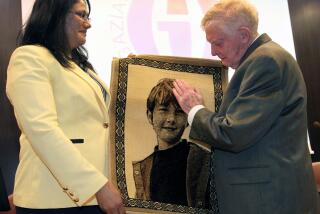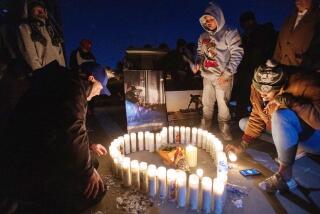Father Tells Story of Life After Death
- Share via
Americans usually embrace new medical technology with a fervor. However, one particularly brilliant and lifesaving technology presents a rare exception. Organ transplantation has been hampered by deeply entrenched public attitudes and practices surrounding organ donation. Despite continued scientific progress and good success rates, a dozen or so people die each day in the United States because of the lack of available organs. It is no wonder, then, that advocates for organ donation have so embraced Reg and Maggie Green, the Bodega Bay, Calif., couple who donated their 7-year-old son’s organs after he was shot in a bizarre highway robbery in 1994 in Calabria, Italy.
The Greens’ gesture astounded much of Europe and impressed their fellow Americans. That an innocent family on a joyful vacation in Europe could withstand such tragedy in a foreign land and still think of others (the Greens offered to donate Nicholas’ organs; they weren’t asked) was stunning.
In “The Nicholas Effect,” Reg Green, a former journalist, describes the tragedy that launched him on a crusade to encourage organ donation. A skilled and eloquent writer, Green describes the shooting that killed his young son and how the couple so very easily arrived at the decision to donate Nicholas’ organs. The remaining two-thirds of the book describes how the decision rocked the world. While later chapters seem overly detailed in their description of the attention the family received after the tragedy, Green ultimately steers the book back to the message he most cares about: how his son became a symbol for sharing life.
Perhaps the greatest insight to emerge from this dramatic story is that many people support the idea of organ donation and praise those who actually do it. The Greens, for example, became heroes. But the persistent lack of organs in the United States and elsewhere suggests that the issue is of low priority in many families. According to experts on donation, too few families discuss the issue in advance and clarify their wishes. And, Green suggests, too few people consider that death “has a purpose.”
Green’s goal is to foster discussion about donation. The book paves the way by describing in the most personal way the beauty of organ donation. Green puts it this way: “[Nicholas’ body] could still help others, however, and far from disfiguring him, that gift, like that of all donors, transformed his earthly self into a symbol of sharing life rather than hoarding it.”
More to Read
Sign up for our Book Club newsletter
Get the latest news, events and more from the Los Angeles Times Book Club, and help us get L.A. reading and talking.
You may occasionally receive promotional content from the Los Angeles Times.






